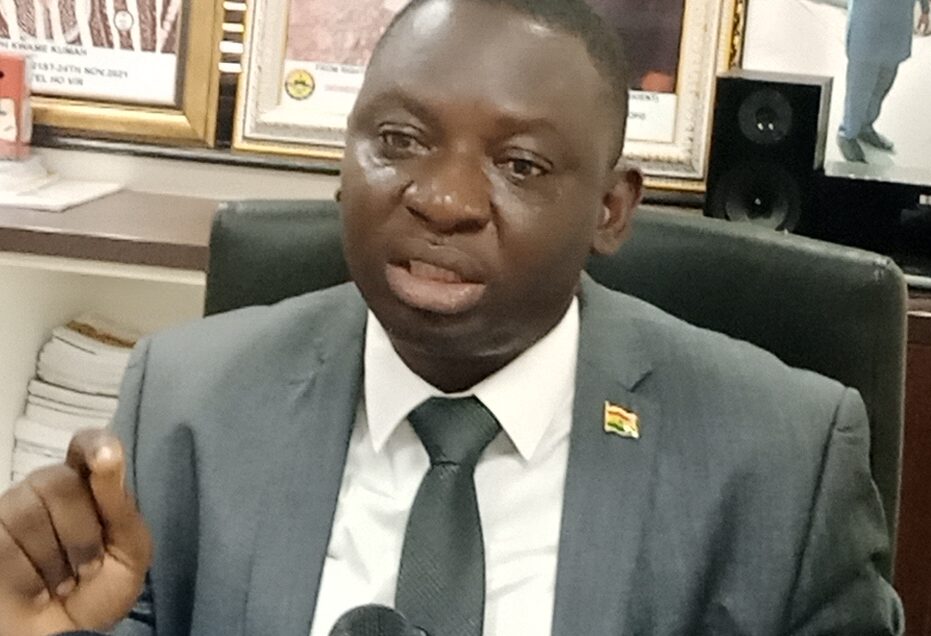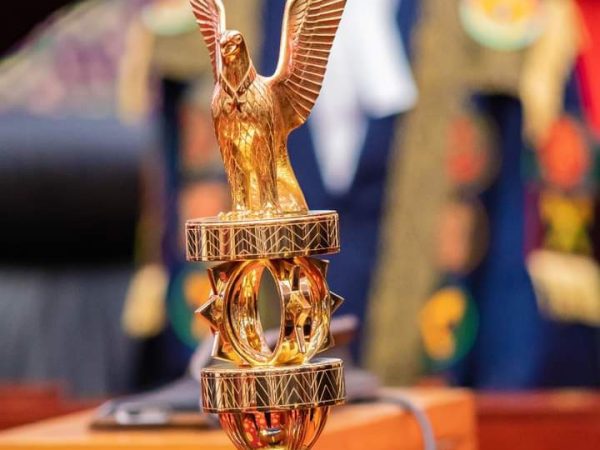MP for Kintampo berates Government for Neglecting Basic Education
The Member of Parliament (MP) for Kintampo North, Hon Joseph Kwame Kumah has berated the government for neglecting the basic level of education in the country.
According to him, despite the constitutional provision of free and compulsory basic education successive governments have over the years failed to implement the system fully.
Hon Kumah made the call in a statement delivered on the floor of parliament on Tuesday, November 1, 2022.
He considered the development as a serious indictment on the states, maintaining that this best describes the lack of concern for developing basic education in the country.
Article 38 (2) of the 1992 Constitution of the Republic of Ghana states that, “the
government shall, within two years after Parliament first meets after the coming into force of this constitution, draw up a program for implementation within the following ten years, for the provision of free, compulsory and universal basic education”.
But Hon Kumah the constitutional provision has not been fulfilled as many school-going children are still loitering on the street, to the extent some have become beggars.
“Mr. Speaker, I will like to use this opportunity to eulogize the late President John Evans Attah-Mills, under whose tenure Ghana recorded 8.14% (in 2011) in terms of education expenditure per GDP ratio, one of the highest in the
history of Ghana. Recently, Ghana allocated 3.6% (in 2021) and 3.5% (in 2022) of its GDP to education which are below the UNESCO threshold of 4%.

He said, “expenditure on basic education declined by 15 percentage points between 2008 and 2020 to the advantage of other subsectors, especially secondary education. For instance, while basic education expenditure has a percentage of total education expenditure reduced from 55.7 percent in 2008 to 40. Percent in 2020,
over the same 12-year period, secondary education’s share of the education expenditure increased from 9.8 percent to about 25 percent. Government allocation to basic education continues to spiral downwards though total allocation to education in the national budget has been on the increase (14% in 2022 over 2021).
“The declining investment in basic education is affecting access and completion, especially in deprived districts. According to the Ministry of Education, there are a total of 15,391 primary and 11,383 JHS in the country, meaning some 4,008 primary schools do not have access to JHS. One of the indicators of equitable access is the Primary to JHS transition. It measures the rate at which primary school children progress to JHS.
“The Ministry of Education set a target of 99% for primary to JHS 2021 base baseline of 94.3% in 2016/17. As of 2020, however national attainment rather declined to 92.5%, below the baseline, with the Northern Region recording 72%, meaning close to a third of primary school pupils drop out, and are not able to continue to JHS in the northern region,” he added.
Full Statement
REVISITING FREE, COMPULSORY UNIVERSAL BASIC EDUCATION (FCUBE)- A CONSTITUTIONAL IMPERATIVE.
STATEMENT BY HON JOSEPH KWAME KUMAH, MEMBER OF PARLIAMENT FOR KINTAMPO NORTH CONSTITUENCY ON THE FLOOR OF PARLIAMENT.
Mr. Speaker, FCUBE is defined as Free Compulsory Universal Basic Education. This educational program saw implementation in 1995 under the late J.J Rawlings administration and further implementation was boosted in 2005 by the erstwhile Kufuor administration.
The focus of the program was to achieve a high rate of children going to school after attaining school-going age for free without any cost bearing to parents or guardians.
This program had many objectives which included; a step to expand and promote good and quality education through basic education as well as to supply materials and infrastructure that aids teaching and learning adequately in all public schools in the country. Article 38 subsection 2 of the 1992 Constitution of the Republic of Ghana, “the
government shall, within two years after Parliament first meets after the coming into force of this constitution, draw up a program for implementation within the following ten years, for the provision of free, compulsory and universal basic education”.
In this regard, I will like to use this opportunity to eulogize the late President John Evans Attah-Mills, under whose tenure Ghana recorded 8.14% (in 2011) in terms of education expenditure per GDP ratio, one of the highest in the
history of Ghana. Recently, Ghana allocated 3.6% (in 2021) and 3.5% (in 2022) of its GDP to education which are below the UNESCO threshold of 4%.
Mr. Speaker, expenditure on basic education declined by 15 percentage points between 2008 and 2020 to the advantage of other subsectors, especially secondary education. For instance, while basic education expenditure has a percentage of total education expenditure reduced from 55.7 percent in 2008 to 40. Percent in 2020,
over the same 12-year period, secondary education’s share of the education expenditure increased from 9.8 percent to about 25 percent. Government allocation to basic education continues to spiral downwards though total allocation to education in the national budget has been on the increase (14% in 2022 over 2021).
The declining investment in basic education is affecting access and completion, especially in deprived districts. According to the Ministry of Education, there is a total of 15,391 primary and 11,383 JHS in the country, meaning some 4,008 primary schools do not have access to JHS. One of the indicators of equitable access is the Primary to JHS transition. It measures the rate at which primary school children progress to JHS. The Ministry of Education set a target of 99% for primary to JHS 2021 base baseline of 94.3% in 2016/17. As of 2020, however national attainment rather declined to 92.5%, below the baseline, with the Northern Region recording 72%, meaning close to a third of primary school pupils drop out, are not able to continue to JHS in the northern region. According to the Ministry of Education, there are a total of 15,391 primary and 11,383 JHS in the country, meaning some 4,008 primary schools do not have access to JHS. The high dropout rate is primarily due to the lack of JHS in about 25% of primary schools nationwide. Next, some 40% of primary schools are located in the seventy-five deprived districts according to the GES classification and 60% of primary schools in the northern region cause pupils to commute very long distances to school, causing dropouts, especially among girls.
Mr. Speaker, there is about 1.3 million learners in SHS, GH₵74 million was allocated by GetFund to SHS in 2021 and disbursement shot up to GH₵100 million, which is 135% increase in expenditure for free SHS. However, same time, Basic Education with over 7 million learners was allocated only GH₵66 million. GOG disbursed only GH₵25 million representing only 37% of the allocation is Basic Education only received a quarter. This explains why about 5,400 schools are under trees and 40% of basic school pupils lack desks and chairs in schools. The sum effect is poor Basic School infrastructure, leading to poor quality education.
Mr. Speaker, the situation in my constituency, Kintampo North, which is also a deprived one, is not too different. There are 15 schools under trees and 21 primary schools without JHS with these school children traveling between 10-12 kilometers a day to access education. After 65 years of independence Mr. Speaker, and the abundance of natural resources the country is blessed with, this should not be the plight of any Ghanaian child.
Mr. Speaker, with current statistics showing that there are some 5,403 schools under trees, sheds, and dilapidated structures across the country without adequate desks and ventilation, there is an urgent infrastructure deficit that needs to be addressed.
Unfortunately, the recent introduction of the Free SHS Policy has worsened the situation since the government’s concentration has been on secondary education to the neglect of basic education. In as much as the free SHS policy is a bold and ambitious initiative that must be commended, it is expected that such an initiative will be built on a very strong basic education foundation.
The Bible tells us in Mathew 7:24-27 to build our house on the rock so that when the rain comes it shall not be blown away. We as a nation will be deceiving ourselves if we believe that putting all our eggs on secondary education will inure positive benefits when the basic education system is weak. As is often said in information technology parlance “Garbage in, garbage out” and if I am allowed to plagiarize the ever-popular statement made by Osagyefo Dr. Kwame Nkrumah on the eve of Ghana’s independence, I wish to state unequivocally that free SHS is meaningless unless it is linked to a strong basic education foundation.
Primary education consistently accounted for the largest share of education
expenditures before 2015, when it was overtaken by spending on junior high school (JHS), senior high school (SHS) and tertiary education. This raises concerns about the equity of public spending because children from poor households rarely make it through to SHS and tertiary education. With about 22% of students not being able to complete JHS nationally, as of 2020, there still exist huge gaps in terms of access and completion of basic education, meaning, a significant number of children will not be able to benefit from the free SHS policy because they are unable to complete their basic education.
Mr. Speaker, it is very critical for the Government to adopt a composite school design for basic schools which incorporates a KG, primary, and JHS to prevent the situation of having 4,000 primary schools without a JHS in the future.
Second, the Ministry of Education must develop an infrastructure plan to provide all primary schools with JHS by 2025, as the Ministry is currently in the process of developing a new medium-term strategy for the period 2022-2025.
Mr. Speaker, considering that 67% of the current education budget goes to the payment of salaries and 25% to goods and services, the remaining 8% for capital expenditure is woefully inadequate to bridge the existing gap. It is important to note that the already meager 8% for infrastructure covers all levels of education namely basic, secondary and tertiary levels.
This, coupled with the capping and securitization of the GETFund receivables has also drastically reduced hitherto available funding for the expansion of education infrastructure. This clearly shows how gloomy the picture looks in terms of bridging the infrastructural gap in order to expand access at the basic education level.
This is why I make the clarion call on the Ministry of Finance to uncap the GETFund and free resources for financing the construction of JHS in all primary schools, especially JHS in deprived districts where close to 30% of primary school graduates are dropping out due to the lack of JHS.
Mr. Speaker, I will like to sound this caution that until we build a strong foundation in terms of quality, accessible basic education, investments into free secondary school education will come with little returns to the nation.
It is therefore my humble appeal to the government to take a critical look at basic education in the country and make conscious efforts to address the systemic challenges of inadequate infrastructure, lack of teaching and learning materials as well as qualified teachers.
Source: expressnewsghana.com
Send your news stories and articles to expressnewsgh@gmail.com or via WhatsApp +233 0543 900 732







